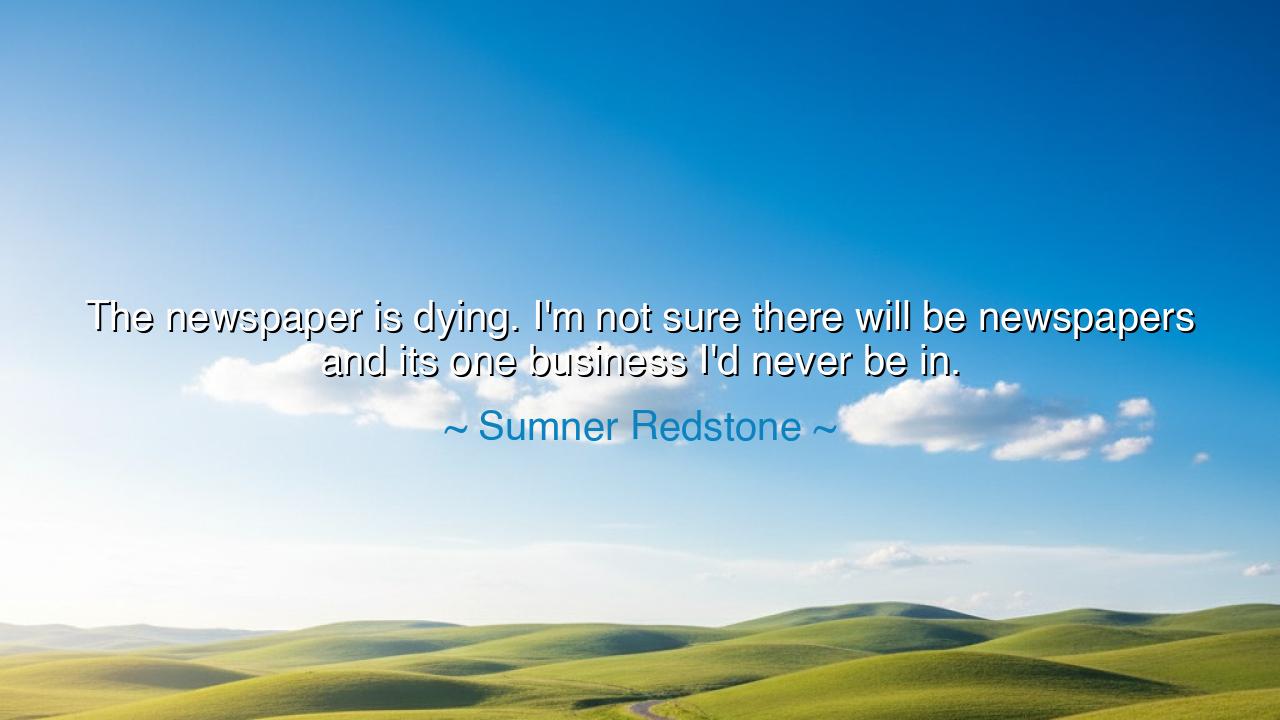
The newspaper is dying. I'm not sure there will be newspapers and
The newspaper is dying. I'm not sure there will be newspapers and its one business I'd never be in.






Host: The pressroom was nearly empty — the ghosts of industry lingering like ink in the air. The machines, once roaring with life, now stood silent, their metallic frames catching the dim light from the high windows. Stacks of unsold papers sat in corners, yellowing at the edges, headlines from yesterday already forgotten.
Jack stood in the middle of it all, hands in his coat pockets, the faint hum of the overhead lights buzzing above him like a tired memory. His shoes crunched faintly against the paper-strewn floor. Jeeny walked behind him, her fingers brushing the dusty edge of an abandoned printing press.
The smell was unmistakable — ink, oil, and time.
Jeeny: softly, breaking the silence “Sumner Redstone once said, ‘The newspaper is dying. I'm not sure there will be newspapers, and it’s one business I’d never be in.’”
Jack: glancing around, a faint smirk tugging at his lips “He wasn’t wrong. But it still hurts to hear it.”
Jeeny: nodding “Because it’s not just paper and ink that’s dying. It’s patience. It’s permanence.”
Jack: quietly “It’s the sound of truth arriving at your door every morning, folded, smelling like something real.”
Host: The rain tapped softly against the glass panes above, like fingertips on memory. In the distance, a train whistle echoed — a faint reminder of movement in a world that no longer paused to read.
Jeeny: walking around the old press, tracing her hand along its cold surface “There was something human about it, wasn’t there? The weight of the paper, the smudge on your thumb, the ritual of turning each page.”
Jack: smiling faintly “And the silence that followed. You’d finish an article and just… think. There was time between information back then.”
Jeeny: softly “Now we scroll. We don’t think. We just react.”
Host: The fluorescent light flickered, the shadow of the press stretching across the floor like a monument to something that once mattered. Jack picked up an old copy from the nearest stack. The headline was dated March 17, 2006 — “Industry at a Crossroads.”
Jack: holding the paper delicately “You know, people used to fight for this. To write the truth. To print it. Every morning was a battle against forgetfulness.”
Jeeny: quietly “And now forgetfulness has Wi-Fi.”
Jack: half-laughing, half-sighing “Yeah. The news travels faster — but somehow, means less.”
Host: The sound of dripping water echoed in the far corner — a rhythmic, patient sound that matched the melancholy of their voices. The old press loomed behind them, its levers and gears now still, as if holding its breath.
Jeeny: thoughtfully “Redstone was pragmatic. He saw it coming — digital, instant, endless. But there’s something tragic about being right in that way.”
Jack: nodding “Progress always comes with a funeral. We just forget to grieve the right things.”
Jeeny: gazing at the paper in his hands “You think the world lost something bigger than an industry?”
Jack: after a pause “Yeah. We lost reflection. When everything becomes instant, nothing feels earned.”
Jeeny: softly “And maybe that’s why misinformation spreads so easily — nobody has to wait for morning anymore.”
Host: The rain grew heavier, its sound filling the silence like applause for the end of an era. Jack folded the newspaper carefully and set it back on the pile.
Jack: quietly “Funny thing is, when the presses stopped, the truth didn’t get louder — it got lonelier.”
Jeeny: softly “Because truth was never meant to compete with noise.”
Jack: looking at her “You think there’s any going back?”
Jeeny: after a pause “No. But maybe there’s going forward — differently. Truth won’t vanish. It’ll adapt. Maybe not on paper, but still written by those who care enough to listen first.”
Host: The camera drifted toward the window. Outside, the street glistened under the rain — the reflection of neon signs flickering where headlines once shone. The world was louder now, faster, but emptier too.
Jeeny: quietly, almost to herself “We traded pages for pixels, but the hunger’s still the same — to know, to understand, to connect.”
Jack: smiling faintly “Then maybe the paper didn’t die. Maybe it just changed shape.”
Jeeny: smiling back “The soul of it remains — the storyteller, the seeker, the one who still believes in what’s true.”
Host: The two stood in silence, the sound of rain their only companion. The old press loomed behind them — a relic of a world that once believed words could outlast the weather.
And as the light flickered one last time, Sumner Redstone’s words seemed to resonate deeper than business — as prophecy, as warning, as elegy:
When paper dies, attention follows.
When truth becomes instant, it becomes fragile.
But even in a world without presses, the storyteller endures —
not for profit, but for permanence.
For the ink may dry, but the need to know will never fade.
And somewhere, in the quiet hum between screens,
the ghost of the newspaper still breathes — waiting for us to listen again.






AAdministratorAdministrator
Welcome, honored guests. Please leave a comment, we will respond soon